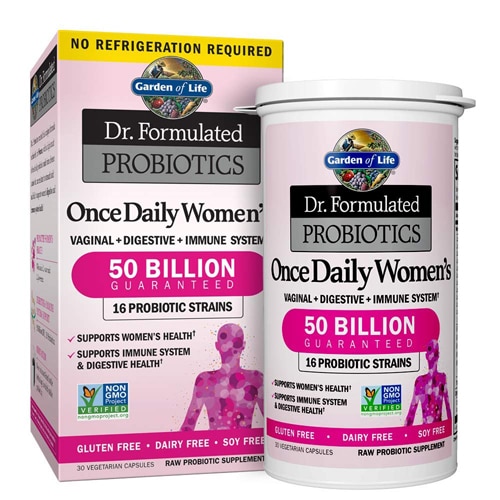Probiotics—micro-organisms that help maintain balance of intestinal bacteria—have become recognized as increasingly essential to good health. One of probiotics’ main claims to fame is helping cultivate healthy gut flora, which in turn promotes general well being. But here’s the buzz: Emerging research now attributes a robust digestive system, particularly the stomach, intestines and colon to general wellness. While the right strain of probiotics (there are thousands of strains, some more effective than others), taken in a sufficient dosage, can benefit both genders, here are three reasons why probiotics for women are important.
1. Supports intestinal flora
Women are more susceptible to some digestive issues, yet many choose not to address them, or they take antibiotics, which can be throw off the balance of healthy bacteria in the body. But in cases of constipation and mild to moderate IBS, probiotics may offer safe, efficacious support. Several studies studies suggest that probiotics reduce antibiotic-associated diarrhea by 60 percent when compared with a placebo. Another study, published in the September 2008 issue of The American Journal of Gastroenterology, found that a multi-strain probiotic, administered daily for 28 days, reduced diarrhea symptoms in IBS patients compared to the placebo group.*
2. Promotes vaginal health
Similar to the intestinal tract, the vagina is a finely balanced microbiome. Beneficial microbes such as probiotics can help keep the vaginal area somewhat acidic, making it difficult for potentially harmful bacteria to survive. Healthy vaginal flora can get thrown out of whack by a number of factors, including antibiotics, spermicides,and birth control pills. Probiotics benefits include helping with microflora balance to support vaginal and urogenital health.*
3. Immunity support
Probiotics not only aid digestion but may help support the immune system as well, so when we do get exposed to unfavorable organisms, our immune system can handle it quicker and more effectively A growing body of research shows that intestinal bacteria play an essential role in immune defenses. One study, published in the April 2011 European Journal of Nutrition, suggests that probiotics can reduce the severity and duration of common cold symptoms.*
Where to find probiotics
Food
To incorporate more probiotics into your diet, there is an array of probiotic foods to choose from. The most natural form of probiotics is fermented foods such as yogurt and kefir. Some common foods made using fermentation include sauerkraut, kimchi (spicy pickled cabbage) and pickles. There is an increasing number of foods fortified with probiotics being introduced as well. While the amount of live cultures is hard to quantify in foods, look for words like raw, lacto-fermented, or unpasteurized on the packaging. These terms indicate that the bacteria haven't been killed off in the manufacturing process
Supplements
Since it can be challenging to get enough probiotics from your diet, a daily supplement can be helpful. When choosing a probiotic supplement, remember that not all brands or strains of probiotics are created equal. Most probiotic supplements include Lactobacillus and Bifidobacterium, but certain strains work better for particular issues, so it’s worth doing some research to find an appropriate strain. Your doctor also may help you sift through the medical literature to find an up-to-date strain. While recommendations can vary, a good strategy is buying a good quality brand from a store or site you trust and taking roughly 12 billion CFU (colony forming units) a day.
*These statements have not been evaluated by the Food and Drug Administration. This information is not intended to diagnose, treat, cure or prevent any disease.





